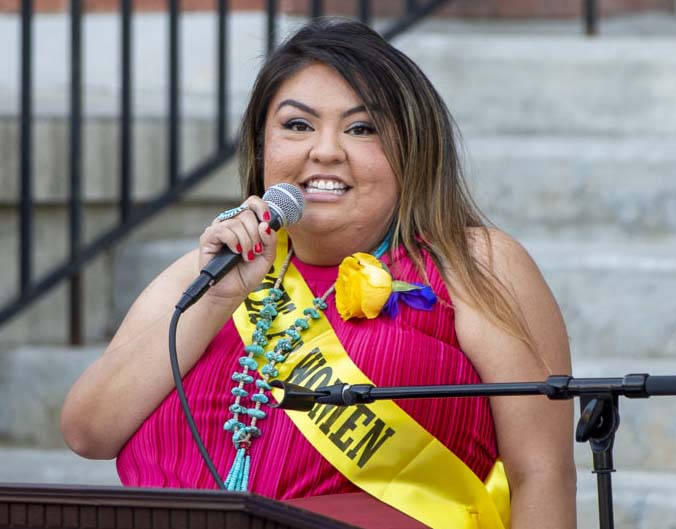
Alina Begay, a coordinator for Indigenous Peoples at Utah State University, was a featured speaker at the “Celebration of a Century, 1920 to 2020″ event held Wednesday in Logan.”
LOGAN – The much-delayed “Celebration of a Century, 1920-2020” event was appropriately held Wednesday to coincide with the national observance of Aug. 26 as Women’s Equity Day.
“We would like to welcome everyone here,” said Barbara Tidwell, co-chair of the Cache Celebration of Women’s Suffrage 2020 committee, greeting the nearly 100 residents who gathered before the steps of Cache County’s History Courthouse.
“Our original celebration was going to be held in March but, because of the COVID-19 outbreak, we put it off,” Tidwell explained. “But perhaps this was an even better day to have our celebration … Today is the 100th anniversary of the ratification of the 19th Amendment.”
In addition to celebrating that momentous victory for women’s suffrage, the event also focused attention on portions of the promise of universal suffrage that have yet to be achieved.
“One hundred years ago today, the 19th Amendment to the U.S. Constitution was ratified and women could no longer be kept away from the ballot box simply because they were women,” Tidwell emphasized. “But the (voting rights) struggle still continued, especially for our Native American sisters and our women of color.”
Native Americans were given the right to vote in 1957, she explained, and African-Americans were not guaranteed the franchise nationwide until the Voting Rights Act overturned the last vestiges of Jim Crow laws in 1965.
Three youthful activists representing minority groups also spoke at the Logan event, highlighting their concerns about continuing inequities in voting rights.
Ana Liquin (a Latina who works as an abuse prevention educator at CAPSA) and Alina Begay (a Navajo woman who is a coordinator for indigenous people at Utah State University) both focused their remarks on physical barriers that minorities often encounter in the process of trying to vote.
They agreed that “their people” are often disadvantaged by lack of assistance translating ballot information and voter identification requirements.
Liguin added that the hours of many polling places are not convenient for some recent immigrants, who are often blue-collar workers.
They also emphasized that many polling places are not located in proximity to minority communities. That’s especially true on Native American reservations, according to Begay.
But Whitney Lee Geertsen, an advocate for persons with disabilities, said that her clients still face both physical and legal barriers to their right to vote.
Since 1984, the Voting Accessibility for the Elderly and Handicapped Act has required that polling places in federal elections be accessible to all voters. But Geertsen said that law is only enforced if a violation is noted and the disadvantaged person sues.
“Still today,” she argued, “handicapped people routinely encounter inaccessible ballots and inaccessible voting booths.”
That’s particularly the case for disabled people who are homeless, since they can’t receive a ballot by mail and often face transportation difficulties in getting to polling places.
The legal barriers to voting for the disabled are equally troublesome, according to Geertsen.
Utahns who are place under legal guardianship due to neurological issues or are judged mentally incompetent automatically lose their voting rights, she explained. The same is true for handicapped persons who have been convicted of felonies or are incarcerated at election time.
Despite those issues, all three advocates urged everyone to make their voices heard in the upcoming general election by voting.
“We are enjoying the privilege of voting thanks to so many brave women – and men – who believed in this great cause,” Tidwell said. “We thank them for all that they have done for us.”
The “Celebration of the Century, 1920 to 2020” was jointly sponsored by the City of Logan, Cache County, the Cache Valley Bank and Utah Public Radio.

